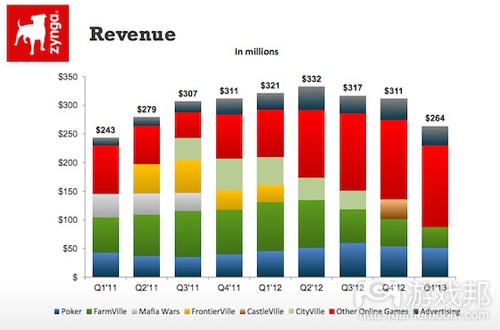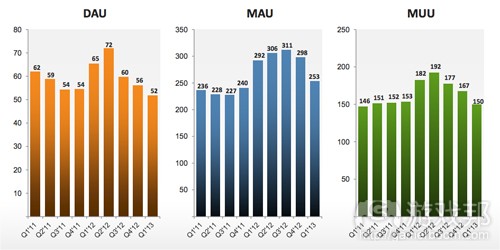每日观察:关注GungHo市值及Zynga第一季度财报(4.25)
1)据serkantoto报道,日本热门智能手机游戏《Puzzle & Dragons》目前用户超过1200万,每月收益达6200万-8600万美元。
其开发商GungHo日前已发布Android英语版游戏,并宣布将向iOS和Android平台推出衍生版游戏《Puzzle & Dragons Challenge》,并于今年发布该游戏的DS版本(这两个版本都仅面向日本市场)。
该公司目前市值在一天内增长15%,达到90亿美元,超越了DeNA(43亿美元)、GREE(30亿美元)和Zynga(26亿美元)等手机游戏巨头。
2)据venturebeat报道,Zynga最新财报显示2013年第一季度(截止3月31日)公司基于GAAP的净收益为410万美元,非GAAP净收益为910万美元;营收为2.635亿美元(去年基于GAAP的营收为3.209亿美元)。
分析师预测Zynga全年营收将达9.497亿美元;值得注意的是,Zynga在今年4月偿还了1亿美元的长期债务,目前不存在未偿还债务。
第一季度Zynga日活跃用户为5200万,低于去年同期时的6500万,比去年第四季度的5600万下滑了8个百分点。月活跃用户为2.53亿,同比去年(2.92亿)下降13%,比去年第四季度(2.98亿)下降15%。
每DAU日均收益为0.049美元(去年同期为0.055美元,去年第四季度为0.051美元),月独立付费用户为250万,比去年同期(350万)下滑30%,比第四季度(290万)下滑14%。
Zynga预计第二季度营收将达2.25亿至2.35亿美元,净亏损为3650万至2650美元。
3)据games.com报道,Zynga首席运营官David Ko日前宣布将于6月底前关闭《Empires & Allies》、《Dream Zoo》和《Zynga City》(腾讯平台)三款游戏,但目前《Empires & Allies》的Facebook页面仍然没有动静,玩家仍可照常玩游戏;《Dream Zoo》在移动平台也并未提及Zynga将关闭游戏的消息。
4)据gamasutra报道,游戏开发平台Unity最近宣布将不再投入Adobe Flash的部署工作,因为他们并不看好Flash的未来。
Unity Technologies公司已在Flash部署到Unity的工作上投入了18个月时间,但从今天开始Unity将不再销售Flash部署授权。其首席执行官David Helgason表示,他们曾对Flash游戏平台抱有很大希望,但由于多种变化原因(游戏邦注:Adobe取消了Flash Players Next,并将重心从Flash转向其他项目),Unity不得不做此决定。
不少开发者对此表示,他们对Unity的这一决定并不感到意外,还有人认为这是Unity将转向支持HTML5的一个信号。
5)据mobile-ent报道,eMarketer最近报告指出,2013年约有93%英国青少年使用手机;智能手机用户在英国青少年中占比81%,而美国青少年的这一比例仅为50%。
预计到2017年,英国青少年智能手机用户比例将增长至96%,届时青少年将成为第二大智能手机用户群体。
Pew Research最近发布2012年第三季度调查报告指出,美国青少年手机用户比例为78%,平板电脑用户比例为23%。(本文为游戏邦/gamerboom.com编译,拒绝任何不保留版权的转载,如需转载请联系:游戏邦)
1)Market Cap Of Puzzle & Dragons Maker GungHo Hits US$9 Billion. DeNA: US$4.3 Billion. GREE: US$3 Billion.
by Dr. Serkan Toto
There is no end to the Puzzle & Dragons hype in Japan, it seems.
The country’s top smartphone game now has over 12 million users, is generating a staggering US$62-86 million – per month, and has been advertised with a new campaign on national TV since the end of March.
Maker GungHo has just announced a DS version of the RPG/puzzle hybrid for later this year, in addition to the release of a spin-off dubbed “Puzzle & Dragons Challenge” for iOS and Android a few days ago (both titles are for Japan only at this point).
And yesterday, the company rolled out Puzzle & Dragons’ English version on Android (here is the iOS version that came out late last year).
GungHo is listed at the Osaka Stock Exchange, and I have pointed out how their market cap has risen over the last few months (driven almost exclusively by Puzzle & Dragons’ growth) quite a few times in the past.
As a reaction to the two Puzzle & Dragons spin-offs and the new English-language Android version of the game, GungHo’s stock price went through the roof yesterday.
After adding close to 15% in a single day, GungHo’s market cap now stands at a mind-blowing US$9 billion.
In that area, GungHo destroy every mobile game company out there, including:
•DeNA (US$4.3 billion)
•GREE (US$3 billion)
•Zynga (US$2.6 billion)
With US$9 billion, GungHo’s market cap exceeds that of national airline ANA, Daihatsu, Mitsubishi Motors, Sanyo Electric, NEC, or Sharp: that’s what one successful smartphone game (a potential new billion dollar franchise) can trigger on the Japanese market.(source:serkantoto)
2)Zynga hits earnings targets and stays profitable in Q1
Dean Takahashi
Embattled social-game publisher Zynga reported better-than-expected earnings for the first quarter ended March 31 and managed to stay profitable. Zynga’s results are closely watched as a bellwether for digital gaming, since Zynga is a huge player in social games on Facebook and it has a big — and growing — presence in mobile games.
Zynga said it had GAAP net income of $4.1 million, or break-even results per share, compared to a loss of $85 million, or 12 cents a share a year ago. Non GAAP net income was $9.1 million, or 1 cent a share, compared with non-GAAP net income of $47 million, or 6 cents a share, a year ago. Revenues were $263.5 million, compared with $320.9 million on a GAAP basis a year ago.
Non-GAAP bookings were $229.8 million, compared with $329.1 million a year ago.
Analysts were expecting the company to report a loss of 7 cents a share on bookings of $209 million. Still, Zynga’s stock is tanking in after-hours trading, down 11 percent at the moment, erasing much of the run-up the stock had in the closing of today’s trading. The stock may be down since all of Zynga’s core metrics are down in the first quarter compared to the fourth quarter.
“We are encouraged by the strong execution from our teams and the breakout hit performance of FarmVille 2, which captures the imagination of nearly 40 million players every month,” said
Mark Pincus, the CEO and founder of Zynga, in a statement. “2013 will continue to be a transition year as we face the challenging environment on the web and invest in developing the leading franchises and network across web and mobile platforms and offer our 253 million monthly players a connected experience that can follow them from work to school to home and anywhere in between.”
For the full fiscal year, analysts expect a loss of 17 cents a share on revenue of $949.7 million. In the previous quarter ended Dec. 31, Zynga reported a profit of 1 cent a share on revenues of $311 million and bookings of $261 million, down 15 percent from a year ago.
Worth noting: Zynga repaid its long-term debt of $100 million in April and it currently has no debt outstanding.
Zynga grew dramatically on Facebook from 2008 to 2012, and it raised a billion dollars in an initial public offering in late 2011. But the stock cratered in August after the company reported weaker-than-expected earnings and a slowdown in casual simulation games on Facebook. Zynga has been struggling to come back ever since.
For the past six months or so, Zynga’s world seemed to fall apart. Zynga’s No. 2 executive John Schappert, the former No. 2 executive at Electronic Arts, resigned on Aug. 8, and a bunch of other executives followed, including chief marketing officer Jeff Karp, chief creative officer Mike Verdu, chief security officer Nils Puhlmann, chief technical officer of infrastructure Allan Leinwand, OMGPOP chief revenue officer Wilson Griegel, Words With Friends co-creators David and Paul Bettner, and Zynga chief financial officer David Wehner. And in February, Zynga’s chief game designer, Brian Reynolds, also left the company.
In the meantime, chief executive Mark Pincus reorganized the management team and laid off employees. David Ko, chief operations officer, has stepped up to fill the management gap. It shut
down “nonperforming” games and cut about 5 percent of the company’s staff, which is still about 3,000 employees. Starting in January, Ko said that the majority of Zynga’s teams are focused on mobile gaming. Ko said in an interview in February that the company had put up more “guard rails” to keep costs under control and to cut weaker games earlier. Among the casualties so far are studios in Austin, Japan, and Boston as well as games like CityVille 2, The Friend Game, and Party Place.
Zynga’s rival, Electronic Arts, recently shuttered three of its once-big social games: The Sims Social, SimCity Social, and Pet Society. It cited a declining interest in those games, and this is a sign to analysts such as Arvind Bhatia of Sterne Agee of across-the-board weakness.
One big hope is Zynga’s move into real-money gambling in the United Kingdom. The company has partnered with Bwin.Party to launch online gambling games in the U.K. market, and it is hopeful that regulators in the U.S. will permit similar online gambling at some point in the future. But the legalization of online gambling is expected to take a long time.
Zynga’s stock price rose in the latter half of trading today before the sell-off. Zynga said that combined bookings for FarmVille and FarmVille 2 grew compared to a year ago. FarmVille 2 is a “breakout hit,” and its daily audience engagement and bookings are exceeding expectations. Zynga’s cross-promotion is working well for its third-party developer, Playdemic, whose Village Life game has grown to 6.5 million monthly active users.
During the quarter, daily active users were 52 million, down from 65 million a year ago and down 8 percent from 56 million in the fourth quarter. Monthly active users were 253 million, down 13 percent from 292 million a year ago and down 15 percent from 298 million in Q4.
Daily average books per average DAU were $0.049, compared with $0.055 a year ago and $0.051 in the fourth quarter. Zynga’s monthly unique payers were 2.5 million, down 30 percent from 3.5 million a year earlier and down 14 percent from 2.9 million in Q4.
For the second quarter, Zynga projects revenues will be $225 million to $235 million. Net loss is expected to be $36.5 million to $26.5 million. Loss per share is expected to be 5 cents to 3 cents a share. Bookings are expected to be $180 million to $190 million. Non-GAAP loss per share are expected to be 4 cents to 3 cents.(source:venturebeat)
3)Zynga will shutter Empires & Allies, Dream Zoo, and Zynga City this quarter
by Brandy Shaul
Just days after learning that Zynga will close The Ville on Facebook on June 24, we’ve learned that three other games are also being shuttered sometime this quarter.
The news comes by way of Zynga’s Q1 2013 earnings call, during which Zynga’s Chief Operations Officer David Ko announced that Empires & Allies, Dream Zoo, and Zynga City on Tencent will join The Ville on Zynga’s “closed games” list sometime in Q2. In other words, all three games will be shut down sometime before the end of June, when Q2 ends.
For now, the Empires & Allies Facebook page and game forums are still silent on the matter, and players can load the game as normal. Dream Zoo on mobile also appears to be running as normal, and there’s no mention of the closure of that game on the Zynga forums either.
It’s likely that at least Empires & Allies players will receive some sort of compensation package when that game closes, similar to how The Ville players can choose a free package of something in some other popular Zynga games. We’ll stay on top of things and will bring you more concrete closure news (and dates) as soon as Zynga announces them. For now, you might hold off on spending any additional money in these games since you likely won’t receive a refund when they shut down.(source:games)
4)Unity drops Flash support, says Adobe is not firmly committed
By Mike Rose
The popular game development platform Unity will no longer invest in Adobe’s Flash, as the company says that it does not believe that the future is certain for Flash.
Although Unity Technologies has been working on a Flash deployment add-on for Unity for around 18 months, the company’s CEO David Helgason said that, as of today, Unity has stopped selling Flash deployment licenses.
“We had high hopes for the future of Flash as a gaming platform,” said Helgason in a blog post on the official Unity website. “The performance of early builds was promising, and Adobe seemed to be dedicated to making it a success.”
However, he added that “Since then much has changed… We don’t see Adobe being firmly committed to the future development of Flash.”
The cancellation of Flash Player Next and Adobe’s decision to move away from Flash and focus more on other projects led Unity to make this call, said Helgason.
The post adds, “Developers are moving away from Flash, and while Flash publishing has gotten little traction, our own Unity Web Player has seen unprecedented growth in recent months.”
Although Unity does not plan to make further investments in Flash deployment, Helgason noted that it will continue to support existing Flash users throughout the Unity 4.x version cycle.
Unity devs react
Judging by the reaction on Twitter, the news hasn’t come as a huge surprise to a lot of Unity devs, and doesn’t appear to have affected a large number of people either.
Chris Etches of Utinni Games questioned, “Did anyone ever actually release a Flash game built with Unity?”, while Piwot Games’ Andrea Sancio noted, “Unity has dropped flash? I was more surprised when they decided to support it…”
For many devs on Twitter, this news was inevitable, and simply marks the last nail in the coffin for Flash.
Demoscener and developer Javier Arevalo called the move “Not surprising,” while Dom Raban, MD at Corporation Pop, said this was “more evidence of the demise of Flash.”
Others are seeing this as a sign that Unity is gearing up to finally support HTML5. Unity’s Helgason previously said at the end of 2011 that the company will only support HTML5 when it’s right for games.
“Bets on when #HTML5 version gets published?” said Jammin Games’ Benjamin Langerak, while indie developer Dave Reed noted, “Would be interesting to see a direct performance comparison of Unity -> Flash and Unity -> HTML5, assuming HTML5 is what’s coming.”
And Donnie Kerrigan of Chunk Group rounded off the majority of thoughts from devs on Twitter, stating simply, “Meaningful Flash publishing from Unity didn’t really exist, so nothing’s changed. But nothing’s got easier.” (source:gamasutra)
5)81 per cent of UK teens use smartphones
by Daniel Gumble
Mobile phone usage among teens far higher in UK than US.
The appetite for technology among teenagers across the UK appears to significantly more ferocious than that of its US counterparts, after eMarketer found that 81 per cent of UK teens use smartphones, as opposed to just 50 per cent in the US.
The new report from eMarketer also found that around 93 per cent of UK teens will use mobile phones in 2013.
It is also estimated that the current percentage of UK teens using smartphones could rise to as high as 96 per cent by 2017. Such penetration gains during this period will position teenagers as the age group with the second-highest penetration rate of all smartphone users.
However, while smartphone usage among US teens may be lagging behind that of UK teens, many teenagers from across the pond are in possession of a mobile phone of some sort.
Based on a study carried out during Q3 2012, Pew Research recently reported that 78 per cent of teens in the US own a mobile phone, while 23 per cent are in possession of a tablet.
Mary Madden, senior researcher for the Pew Research Center’s Internet Project and co-author of the report, said: “The nature of teens’ internet use has transformed dramatically — from stationary connections tied to shared desktops in the home to always-on connections that move with them throughout the day.
“In many ways, teens represent the leading edge of mobile connectivity, and the patterns of their technology use often signal future changes in the adult population.”(source:mobile-ent)













































 闽公网安备35020302001549号
闽公网安备35020302001549号